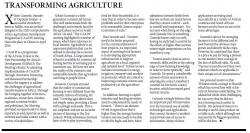KZN Business Sense - TRANSFORMING AGRICULTURE2016-06-22 Xolani Gumede, founder of Cappeny Estates' a successful strawberry farm in Ballito, was an invited delegate to the 12th Comprehensive Africa Agriculture Development Programme (CAADP) meeting that took place in Ghana in April 2016.
CAADP is a programme of the African Union in the New Partnership for Africa's Development (NEPAD). The Meeting's theme 'Accelerating Implementation of CAADP through Innovative Financing and Renewed Partnership' reflects the urgency to address the challenges of agricultural transformation in Africa. Through the bringing together of farmers, academics, researchers, funders, regional economic bodies and politicians, the Meeting provided an opportunity to share experiences and expertise as well as network and make contact with a variety of stakeholders. Xolani Gumede is a first generation commercial farmer who well understands both the challenges and rewards faced by the agriculture sector in South Africa. He said, "The CAADP meeting highlighted a number of issues, which have relevance to local farmers. Agriculture is an important platform that can be utilised to develop the economy of South Africa. A large amount of land is available for commercial faming but this is not being put to maximum use. We have not seen the reality of the extensive and sustainable benefits that agriculture can bring to people's lives." However, Gumede stressed that the reality of commercial farming is very different from the romantic notion of farming. He said, "Growing agriculture does not simply mean providing a famer with a plough and seeds. This is too simplistic and not an accurate picture of farming in the 21st century. While subsistence farmers have a role to play in providing food for their households, it is clear that in order to become more profitable and for their enterprises to be sustainable, famers require economies of scale." But Gumede said, "Farmers need to be better prepared for the commercialisation of their projects. An important aspect of assisting local farmers is in developing appropriate infrastructure to support agriculture on a local, regional and national level." Infrastructure includes investments in energy, irrigation, transport and markets in particular, which are critical to improving economic returns and productivity in the agriculture sector. In addition, farming is capital intensive and funding providers need to understand the needs of farmers. "There is an element of risk in agriculture that is higher than the average business venture and one needs to be able to ride the highs and lows. Most subsistence farmers battle from day one as there are many factors that they cannot control - such as rainfall and temperature. It is not easy when living on the edge," said Gumede.This is something Gumede knows only too well, having recently had to control for the effects of higher than normal winter night temperatures on his strawberry crop. "Famers need to have access to research, skills and be at the cutting edge of new farming knowledge in order to farm optimally," said Gumede. He spent a considerable amount of time and money in selecting the correct strawberry varieties for his farm's coastal location, which has reaped good harvest returns. Gumede strongly believes that an important part of innovation is in the increased use of mobile technologies and applications that connect farmers to markets and provide ease of access to information. Many of these applications are being used successfully in a variety of African countries and South African farmers need to have access to the same advantages. Gumede's advice for emerging farmers is to be different and to look beyond the obvious crops grown and identify niche crops. However, he cautioned that there is a price to pay for being a pioneer as one needs to have courage in the face of difficult odds. He said, "Farmers must discover their own solutions which are applicable to their unique set of circumstances." His personal mantra is that 'Wisdom needs courage to flourish' which has served him well in his current business undertaking. He added that while often challenging he was sorry that he did not start farming much earlier in his life. His personal vision is to develop a world-class product on a viable scale, which although not necessarily the biggest operation, will be the best. |
KZN Business Sense - TRANSFORMING AGRICULTURE
Copyright © 2024 KwaZulu-Natal Top Business
